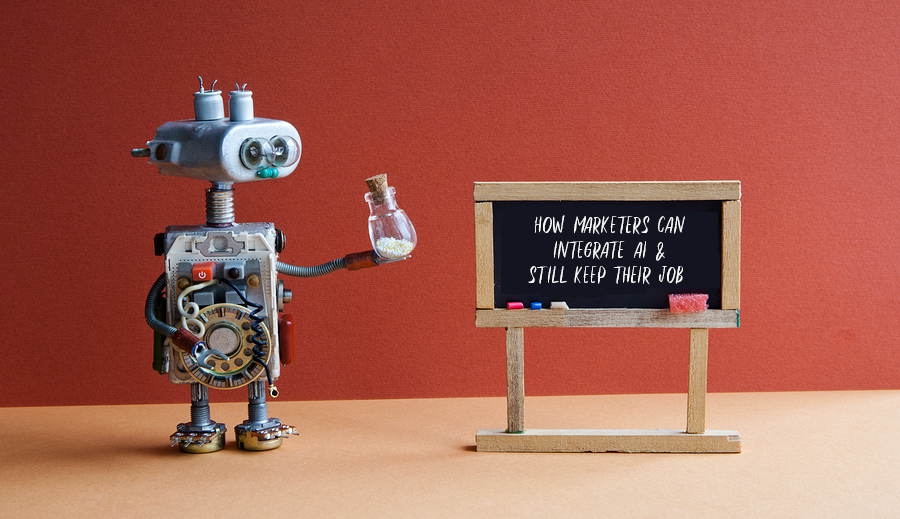

While listening to NPR the other day, an interesting podcast caught my attention and prompted me to do a little research of my own. The topic of discussion was: “The Evolution of Artificial Intelligence.” In the podcast, they were talking about how AI can be exciting yet frightening at the same time, and how to embrace this change in our lives. Given the current day and age, AI is an ever pressing and important topic for many people around the world. Especially those people whose jobs could be on the line with AI growing at such a rapid pace. This topic brought about many realities that we as Marketing professionals currently face, as well as highlighting how these professionals should not fear AI but view it as an ally.
At the end of the day, we can all benefit from incorporating AI to make our daily lives better.
So, what is AI?
“Artificial intelligence is the science of making machines smart, in order to augment and enhance human capabilities. There are a number of technologies that are considered AI, and they’re at varying degrees of maturity. These technologies include machine learning, deep learning, natural language generation (NLG), natural language processing (NLP), and image recognition.”
Digging into research about AI, here are some of the highlights:
“According to Constellation Research, businesses across all sectors will spend more than $100 billion per year on Artificial Intelligence (AI) technologies by 2025, up from a mere $2 billion in 2015. The marketing industry will be no exception.”
According to Salesforce, 51% of marketers are currently using AI.
Salesforce predicts that by 2019, this number will grow by 27% allowing companies to leverage the power of AI to gain valuable insights about their customers, automate tasks and improve workflow. AI is already part of everyday life, powering advances in technology that we use on a regular basis, in ways that you may not recognize but already use.
Below are some interesting examples of consumer applications powered by some form of AI:
- Photo Applications — such as Facebook and Apple Photos, outline people’s faces and prompt you to tag them by name.
- AI Powered Voice Technology — During the Google’s annual conference for developers, the company showed off a robot with a voice so convincingly human that it was able to call a salon and book a haircut – never revealing that it wasn’t a real person making the call.
- AI Powered Suggestions — Phone and texting apps offer context-appropriate quick replies (like “I’m in a meeting”) for you to tap and select.
- AI Powered Suggestions based on Behavior — Netflix will recommend new shows based on your viewing history while Amazon will recommend products based on your purchase history.
- AI Powered Search Engines — Google and other search engines suggest text strings that you might have in mind as you type and personalize your search returns based on your location and your past online behavior.
When thinking about marketing and advertising, many organizations are already leveraging AI in ad targeting and customer segmentation. Below are a few examples:
- Optimized advertising uses AI to make decisions based on the full range of data available — including unstructured data such as sentiment and mood. For example, marketers at IBM teamed up with MediaMath to activate true AI-driven programmatic marketing to extract predictive signals from exposure to large amounts of data.
- Hyundai recently used artificial intelligence to select which social media influencers’ to work with. The AI technology chose the best influencer’s that matched best with the car brand from 20K different online personalities. Early results from the initiative showed nearly 100% positive sentiment from the audience and generated over 15 million total impressions.
- Putting the Person in Personalization: marketers can leverage AI technology to create highly personalized messaging that goes beyond targeting with the user’s first name.
- Using AI, marketers can predict which message is most likely to be effective based on a customer’s profile and their past engagement. This insight will allow them to determine if they should send a webinar invite or white paper, offer a discount or an invite to an event to that customer.
Here at Just Media, we are already using AI to optimize campaigns with programmatic executions. As an agency, we will continue to be forward thinking, testing new technologies and integrate AI in our tech tools to allow us to be able to drive better overall performance for our clients. Learning which AI technologies to integrate will allows us to optimize in real time and focus our efforts on what matters most — being strategic experts to drive results for our clients.
Levering AI will allow us as marketers to be more efficient, effective and provide scale on campaign operations and executions that will help us deliver on our client services. AI will certainly continue to transform the advertising industry, as there are many marketing functions that are already being automated by AI. Any job that consists largely of repetitive tasks can be automated by AI that excels at analyzing big data, recommendations, and predictions.
With all of these advances in technology and AI, MARKETERS DO NOT HAVE TO WORRY — there will always be a need for human insights behind the machine technology. At the end of the day, it is the marketers who are the experts at making the human connection between brands. Leveraging AI will enable to free up our time that would have spent our tedious spreadsheets and repetitive aspects of our jobs as marketers.
What do marketers need to do to prepare themselves and get ready for the future of AI?
- Experiment with artificial intelligence: There are already a lot of tools available to try and many providers that offer free trials. For Example, Google Analytics reporting offers PaveAI that can automate your report. With this tool, marketers can be more efficient with their time and be able to provide additional insights on top of reporting that put together for our clients. The final product will provide hard data and real insight in a way only a human-machine team can.
- Be curious and learn the fundamentals of AI: Now is a great time to develop our technical acumen and focus on the human qualities that set us apart from machines. AI is still in its infancy so we can learn about some of the technology’s fundamental concepts, understanding the theory behind AI technologies to better position us to identify how AI will affect our job.
- Be a critical thinker, creative and a thoughtful analyst: No matter how advanced AI becomes, there will still be a lot of subjectivity that makes it hard for AI to completely replace humans in the office. AI assistants cannot do the job of communicating, collaborating, synthesizing, and making decisions the way a human can.
We as marketers are working in very fast paced environments and many of us would welcome a helping hand to assist with tackling our lengthy to-do lists — even if that hand is a robotic one. With better technology and smarter data that AI can provide, marketers would get some much-needed assistance with the more tedious and error-prone tasks of their everyday responsibilities. Marketers would able to dedicate more time to focus on the key marketing message and overall customer experience to provide better overall campaign performance.

Have a question about marketing in an AI world? Connect with our team. We’d love to geek out with you.
S O U R C E S
KQED Podcast >>
Constellation Reseach >>
HBR >>
IBM Watson Advertising >>
Business Insider >>
